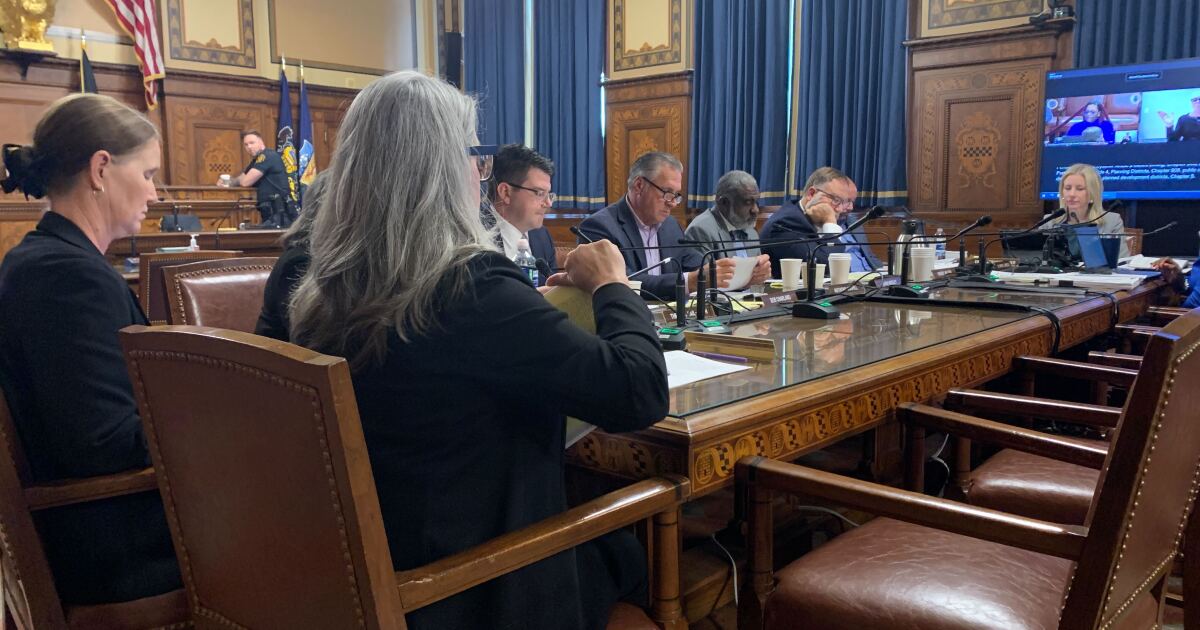For a while Wednesday, more than a year’s worth of deliberation over a controversial affordable housing policy seemed on the verge of concluding in Pittsburgh City Council. But after nearly two hours of debate and testimony from dozens of public commenters, the fight appears likely to go another round instead.
Councilors narrowly voted 5-4 on Wednesday to rewrite Mayor Ed Gainey’s proposed “inclusionary zoning” policy, which as originally proposed last fall, imposes a mandatory requirement to include affordable units in new housing construction. In the new version, which Council member Erika Strassburger tried to propose a week before, the program would offer voluntary tax incentives for developers who choose to build affordable units.
And while Strassburger had hoped to tee up the rewritten measure for a final vote next week, council decided to send it to the city’s planning commission for review instead. That will likely mean months of additional discussion.
“ I know there’s gonna be a lot of discussion not only today, but in the days, weeks and months ahead,” said councilor Khari Mosley. “ I think we have laid the groundwork for a longer discussion.”
Strassburger’s move to jump-start discussion of the new bill attracted criticism, but she professed a willingness to engage in further discussion as the bill moves through the Planning Commission.
“Certainly this opens up additional opportunities for conversation, which of course, I’m always open to, even though we’ve had a lot of it up to now,” she said.
Planning must consider the bill within 90 days, and council typically has 120 days to hold a public hearing after the commission weighs in. That timetable would mean IZ would outlast the mayor who proposed it, and not be resolved until after a new mayor, either Democrat Corey O’Connor or Republican Tony Moreno, takes office.
The city Planning Commission previously approved the mandatory affordable-housing approach. But any time council subsequently changes a zoning proposal that the commission has approved, the alterations may have to be resubmitted for review, depending on their scope.
Strassburger said council chose to take that route after receiving an opinion from the law department this morning. That opinion described the changes as a “borderline case,” but still recommended that Planning be given a chance to weigh in.
Mosley, for one, expressed hope that the process could “achieve two goals that I think are very critical for the future prosperity of the city: one is to promote population and economic growth, but also meaningfully addressing the city’s housing crisis.”
Conflict and disagreement over inclusionary zoning has simmered since last fall. Supporters of expanding the policy, which already exists in some city neighborhoods. see it as a way to avoid segregating housing by class. Opponents say it would discourage building new homes by requiring developers to take a loss on affordable housing units.
Gainey put the mandatory IZ approach at the center of his failed reelection campaign this spring. The issue figured prominently in the Democratic mayoral primary, which Gainey lost to County Controller Corey O’Connor. O’Connor has previously said he doesn’t think a citywide policy is the right tool to promote affordable housing.
Strassburger previously indicated a desire to broker a compromise on IZ, and said last month that she would like to amend the bill. Following months of discussions with the administration, she proposed retooling it into a voluntary program throughout most of the city, offering financial incentives to developers who opt in at various levels.
Gainey expressed disappointment at Strassburger’s changes in a statement Wednesday following the meeting.
“Rather than prioritizing polices that uplift working families struggling to find housing they can afford, the Strassburger amendment caters to entrenched private interests and developers, setting back years of people-centered progress,” he said.
“My administration negotiated in good faith with Councilperson Strassburger for months and made meaningful progress on a compromise bill that many could support. Unfortunately, Councilperson Strassburger instead chose to distort our compromise at the eleventh hour in a way that no longer serves the needs of our communities, while maintaining the appearance of a program that does.”
Wednesday’s amendments include other changes, adding an option for developers to contribute to a housing fund rather than building the affordable units themselves. The scaled-back requirements would also shorten the time frame during which units would have to offer discounted rents: The new proposal would require affordable rates for 20 years, down from 35.
The bill includes two other distinct components of Gainey’s housing plan: an option to build “granny flats” alongside existing properties, and the elimination of a requirement to set aside parking space for each new housing unit. Both those changes were initially envisioned as ways to make new housing easier to build.
Strassburger and four other councilors who have previously criticized mandatory inclusionary zoning — Anthony Coghill, Theresa Kail Smith, Bobby Wilson and Bob Charland — voted for the amendments on Wednesday. Four councilors who have historically supported inclusionary zoning — Barb Warwick, Deb Gross, Khari Mosley and Dan Lavelle — voted against.
Discussion of the measure reprised a number of by-now familiar talking points. Opponents of mandatory inclusionary zoning, like Coghill and Kail-Smith, argued that the city has already spent plenty on affordable housing and needs to focus on growth. Proponents of the approach, like Warwick and Gross, argued it would prevent popular neighborhoods from becoming “playgrounds for the rich.”
Last week, Deputy Mayor Jake Pawlak said Gainey would veto the amendments Strassburger originally proposed. The version council passed Wednesday includes some minor changes to the proposal Pawlak rejected. But it’s unclear whether Gainey will have a chance to act on it at all before he leaves office at the end of the year.

